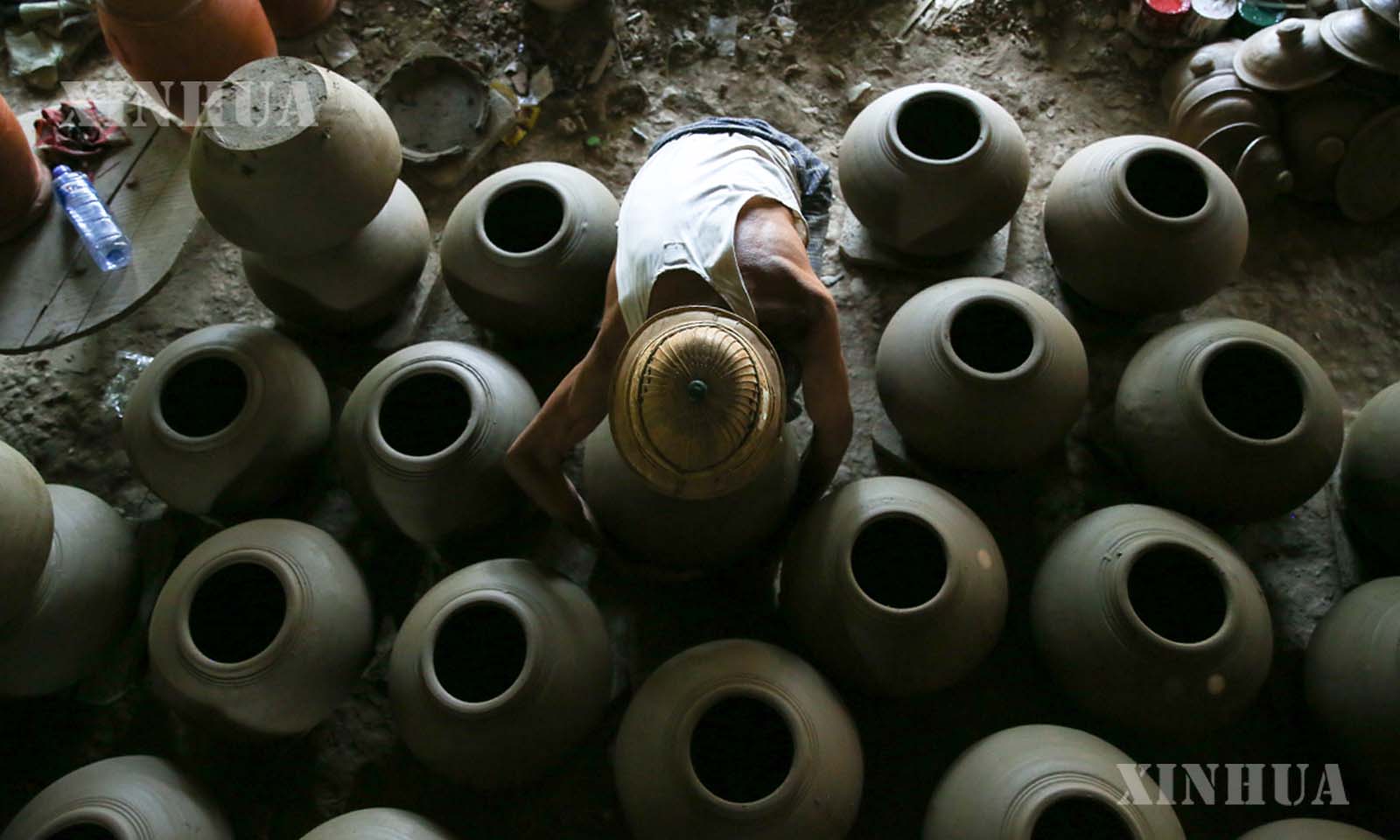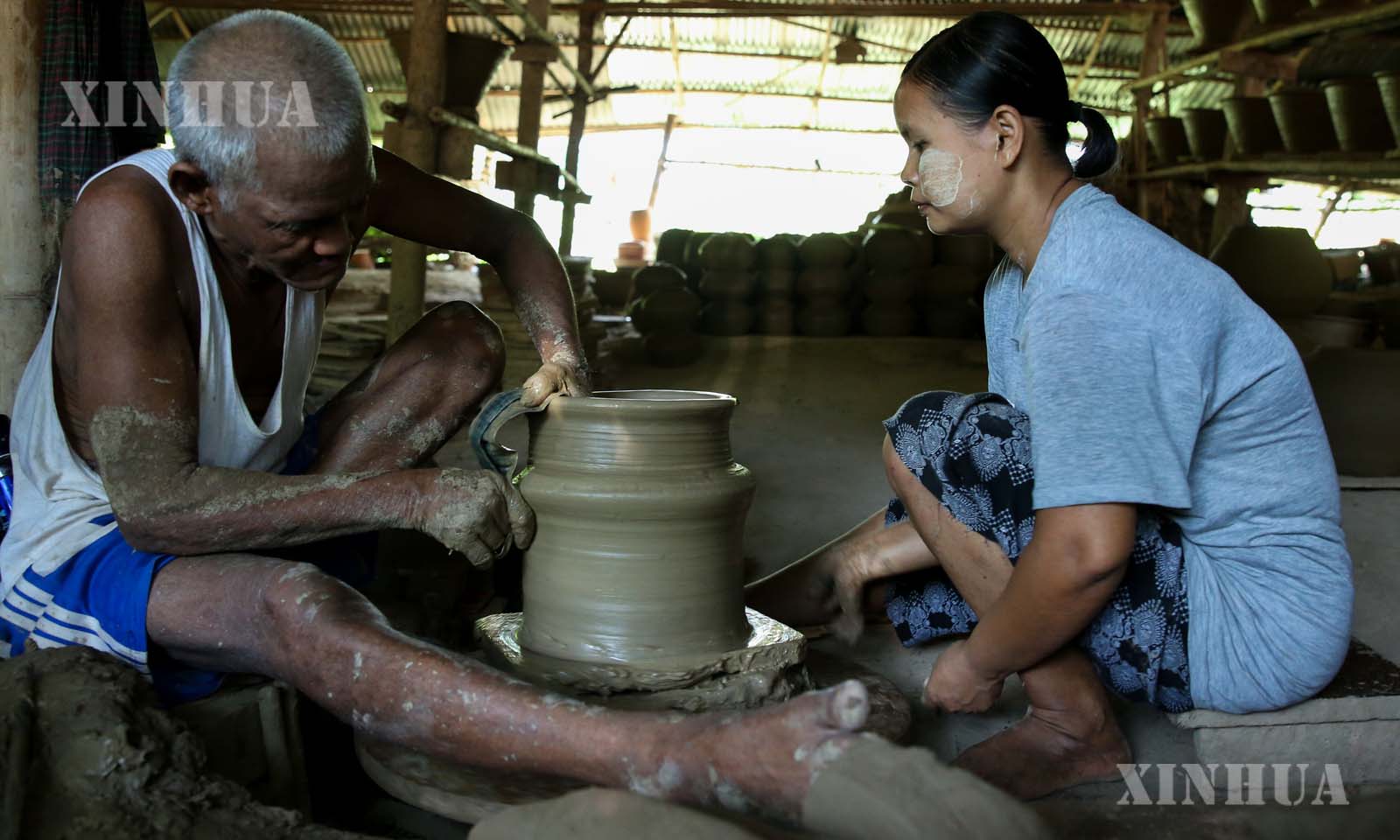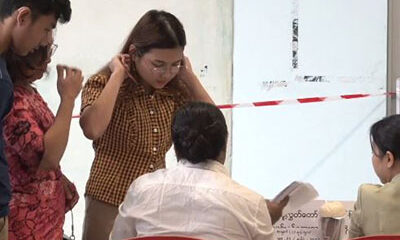Culture & Entertainment
မြန်မာ့ရိုးရာမြေအိုးလုပ်ငန်း ဆက်လက်လုပ်ဆောင်ခြင်းဖြင့် အမွေအနှစ်ကို ထိန်းသိမ်းလျက်ရှိ

ရန်ကုန်၊ ဧပြီ ၃၀ ရက် (ဆင်ဟွာ)
မြန်မာနိုင်ငံတွင် ကျွမ်းကျင်သော အိုးဆွဲလုပ်သားများ (အိုးပြုလုပ်သူများ) ရှားပါးလာခြင်းကြောင့် ရိုးရာအနုပညာမြေအိုးလုပ်ငန်း ကျဆင်းမှုနှင့် ရင်ဆိုင်နေရသည်။ ထို့ကြောင့် ယနေ့ခေတ် မြေအိုးလုပ်ငန်းစီးပွားရေးမှာ မြန်မာ့ရိုးရာ အမွေအနှစ် အိုးလုပ်ငန်း ထိန်းသိမ်းရေးအတွက် မရှိမဖြစ်အရေးပါကြောင်း ရန်ကုန်တိုင်းဒေသကြီး တွံ့တေးမြို့ရှိ ဦးထွန်းရီနှင့် ဒေါ်တိုးမြေအိုးလုပ်ငန်းပိုင်ရှင် အသက် ၈၄ နှစ်အရွယ် ဒေါ်တိုးက ဆင်ဟွာကို ပြောသည်။
ယခင်က အိုးလုပ်ငန်းပညာရပ်ကို လူကြီးများက လူငယ်မျိုးဆက်များထံ လက်ဆင့်ကမ်းပေးလာခြင်းဖြစ်သည်။ သို့ရာတွင် လူငယ်များက အလုပ်အကိုင်အခွင့်အလမ်းရရှိရန် မြို့ပြများ သို့မဟုတ် ပြည်ပနိုင်ငံများသို့ သွားရောက်လုပ်ကိုင်ကြခြင်းကြောင့် အိုးလုပ်ငန်းပညာရပ် လက်ဆင့်ကမ်းမှုမှာ မှေးမှိန်လာခြင်းဖြစ်ကြောင်း ၎င်းက ဆိုသည်။

မြန်မာနိုင်ငံ ရန်ကုန်တိုင်းဒေသကြီး တွံတေးမြို့ရှိ အိုးလုပ်ငန်းတစ်ခုတွင် အိုးပြုလုပ်နေသူများကို ၂၀၂၄ ခုနှစ် ဧပြီ ၂၉ ရက်က တွေ့ရစဉ် (ဆင်ဟွာ)
ထို့ကြောင့် ယင်းရိုးရာအစဉ်အလာ ပညာရပ်ကိုထိန်းသိမ်းရန် အသက်အရွယ်ကြီးသူများသာလျှင် ကျန်ရှိတော့ကြောင်း၊ တန်ဖိုးမဖြတ်နိုင်သော ယဉ်ကျေးမှုဓလေ့ ပြန်လည်သက်ဝင်လာစေရေးနှင့် တည်တံ့စေရေးအတွက် ထိန်းသိမ်းမှုများ အရေးပေါ်လိုအပ်ကြောင်းလည်း ဒေါ်တိုးက ပြောသည်။
စစ်ကိုင်းတိုင်းဒေသကြီးတွင် SMO မြေအိုးအရောင်းဆိုင် ပိုင်ရှင် ဦးစိုးနိုင်ဦးက “ကျွန်တော် အိုးလုပ်ငန်း လုပ်ကိုင်တာ နှစ်သုံးဆယ်ကျော် လေးဆယ်လောက်ရှိပြီ။ ကျွန်တော်တို့ဆီက ထွက်တဲ့အိုးတွေကို လက်လီရော လက်ကားဝယ်လက်တွေရောရှိပါတယ်” ဟု ဆင်ဟွာကို ပြောသည်။
“ကျွန်တော်တို့ဆိုင်မှာတော့ မြေအိုးတွေအမျိုးစုံရောင်းတယ်။ ပန်းအိုးတွေလည်း အဝယ်များကြတယ်။ အိုးကြီးတွေကိုတော့ ဧရာဝတီတိုင်းက သောက်ရေအတွက် တစ်နှစ်စာ မိုးရေတွေလှောင်ဖို့ အများဆုံးဝယ်ကြတယ်။ ရန်ကုန်ကတော့ အလှစိုက်ပန်းအိုးတွေ အဝယ်များတယ်။ မြေအိုးတွေကတော့ အသုံးဝင်နေဆဲပါပဲ” ဟု ဦးစိုးနိုင်ဦးက ပြောသည်။
လက်ရှိတွင် ကုန်ကြမ်းဈေးနှုန်းများမြင့်တက်ခြင်းနှင့် သယ်ယူပို့ဆောင်ရေးစိန်ခေါ်မှုများက မြေအိုး၊ ပန်းအိုးဈေးနှုန်းများအား မြင့်တက်စေသည်။ ထိုသို့ဈေးနှုန်းများမြင့်တက်နေသော်ငြားလည်း ယခုနှစ်၏ ရောင်းအားများမှာမူ ယခင်နှစ်နှင့် နှိုင်းယှဉ်ပါက အပြောင်းအလဲမရှိကြောင်း ၎င်းက ဖြည့်စွက်ပြောခဲ့သည်။
အသက် ၅၃ နှစ်အရွယ် ဒေါ်ချိုချိုလွင်က မြေအိုးကိုရွေးချယ်အသုံးပြုရခြင်းအကြောင်းကို ယခုလိုပြောပြခဲ့သည်။ “ကျွန်မငယ်စဉ်ကတည်းက သောက်ရေအိုး၊ ဘုရားပန်းအိုး၊ ရာဝင်အိုးတွေ အမြဲသုံးတာပဲ။ မြေအိုးကကျတော့ မြေဓာတ်လည်းပါတော့ ရောဂါလည်းကင်းတယ်။ ဘုရားပန်းအိုးတွေဆိုရင်လည်း မြေအိုးနဲ့ဆိုတော့ ဘုရားပန်းလေးတွေလည်း တော်တော်နဲ့မညှိုးဘူးလေ”
ဧရာဝတီတိုင်းဒေသကြီး ဘိုကလေးမြို့နယ်မှ အသက် ၄၀ နှစ်အရွယ် မသိန်းသိန်းအေးကလည်း “ကျွန်မတို့အိမ်မှာတော့ သောက်ရေအိုး၊ ပန်းအိုးတွေသုံးပါတယ်။ ပလတ်စတစ်အိုးထက် သောက်ရေအိုးတွေက သဘာဝအတိုင်းအေးတာရော ကျန်းမာရေးနဲ့လည်း ညီညွတ်တော့သုံးတာပါ။ ပြီးတော့ ဟင်းချက်တာတွေ၊ ဆန်ပြုတ်တွေ၊ ဆေးကြိုတာတွေကလည်း မြေအိုးနဲ့ပဲသုံးတာပိုကောင်းတယ်” ဟု ပြောသည်။
မြေအိုးကို အသုံးပြုခြင်းအားဖြင့် မြန်မာ့ရိုးရာအမွေအနှစ်ကို ထိန်းသိမ်းသည်သာမက ကျန်းမာသော လူနေမှုပုံစံလည်းဖြစ်ကာ အသက်လည်းရှည်နိုင်ကြောင်း ၎င်း၏ အမြင်ကိုပြောပြသည်။
ရိုးရာမြေအိုးလုပ်ငန်းမှာ ရာစုနှစ်တစ်ခုနီးပါးရှိပြီဖြစ်ကြောင်း၊ မကြာသေးမီနှစ်များအတွင်း ပလတ်စတစ်ထုတ်ကုန်များ ပေါ်ထွန်းလာခြင်းကလည်း မြေအိုးဈေးကွက်ကို အနည်းငယ်ကျဆင်းလာစေကြောင်း ဦးထွန်းရီနှင့် ဒေါ်တိုးမြေအိုးလုပ်ငန်းပိုင်ရှင်၏ သမီးဖြစ်သူ ဒေါ်မြင့် ပြောကြားချက်အရ သိရသည်။
မြန်မာနိုင်ငံရှိ တွံတေးမြို့သည် အိုးလုပ်ငန်းကြောင့် နာမည်ကျော်ကြားခဲ့သည်။ ယခင်က ယင်းဒေသ၌ အိုးလုပ်ငန်း လုပ်ကိုင်သူ ၂၀ ခန့်ရှိခဲ့သော်လည်း ယခုအခါတွင်မူ ၁၀ ဦးခန့်သာကျန်ရှိတော့ကြောင်း သိရသည်။
“ဒီခေတ်မှာက အိုးလုပ်ငန်းပညာတတ်သူက နည်းလာတယ်။ ကုန်ကြမ်းကလည်း ရှားပါးလာတော့ လုပ်ရတာ နည်းနည်းတော့အခက်အခဲတွေ့လာတယ်။ ဒီလုပ်ငန်းက ဘိုးဘွားပိုင်လည်းဖြစ်တော့ ဆက်ပြီးတော့လုပ်သွားမှာပါ။ မျိုးဆက်သစ်တွေအတွက်လည်း မြန်မာ့ရိုးရာအိုးလုပ်ငန်းအမွေအနှစ်ကို ဆက်လက်ထိန်းသိမ်းဖို့လည်း အရေးကြီးပါတယ်” ဟု ဒေါ်မြင့်က ဖြည့်စွက်ပြောခဲ့သည်။ (Xinhua)
………………………..
(English Version)
Continuation of traditional clay pot making in Myanmar ensures preservation
YANGON, April 29 (Xinhua) — The traditional art of clay pot making in Myanmar is facing a decline as the number of skilled potters dwindles. Thus, the presence of clay pot making businesses today is essential for safeguarding Myanmar’s traditional pottery heritage, the owner of the U Tun Yi and Daw Toe clay pot business, Daw Toe, 84, who lives in Twante Township of Yangon Region, told Xinhua.
In earlier times, knowledge and skills were passed down from the elderly to the younger generations, ensuring continuity. However, with the youth migrating to urban areas or abroad for work opportunities, the transmission of this art is hindered, she said.
Consequently, only the elderly remain to uphold this tradition, Daw Toe, highlighted the urgent need for efforts to revive and sustain this invaluable cultural practice.
“With three decades of experience, I’ve operated clay pot business, serving both retail and wholesale customers with our clay pots,” U Soe Naing Oo, owner of SMO clay pot shop in Sagaing Region told Xinhua.
“At our shop, we offer a variety of clay pots, with vases being the most popular choice among customers. Big clay pots are mainly bought in the Ayeyarwady region for storing water, while vases are popular in Yangon. This demand indicates that the clay pot market is still thriving,” he said.
At present, the rising prices of raw materials and transportation challenges have caused clay pot prices to increase. Despite the price increases, this year’s sales rate has remained consistent compared to previous years, he added.
“Since my youth, I’ve always relied on clay water pots and vases at home. I’ve found that using clay vessels for flowers extends the longevity of the flowers,” Cho Cho Lwin, 53, shared her reason for choosing clay pots.
Thein Thein Aye, 40, who lives in Ayeyarwady region’s Bogale Township said “at our home, we prefer using clay water pot over plastic to ensure naturally cold and healthier water. Additionally, using clay pots for cooking, especially for soups and herbs, enhances their nutritional value.”
Embracing this tradition not only preserves Myanmar’s heritage but also promotes a healthier lifestyle, she added.
Daw Myint, the daughter of the owner of the U Tun Yi and Daw Toe clay pot business, said this clay pot business has been around for almost a century. At present, the clay pot market has experienced a slight decline in recent years, partly due to the emergence of plastic alternatives.
In Myanmar, Twante Township has long been renowned for its pottery businesses. In the past, around 20 people were running pottery businesses, but now only about 10 remain, she said.
“Today, we’re dealing with problems like not having enough materials and fewer skilled workers. For me, this business is not just about profit, it’s a tribute to my grandparents and a vital endeavor in preserving Myanmar’s pottery heritage for future generations,” she added.
Photo 1: A potter works at a workshop in Twante Township of Yangon Region, Myanmar, April 29, 2024. (Photo by Myo Kyaw Soe/Xinhua)
Photo 2: Two potters shape a clay pot at a workshop in Twante Township of Yangon Region, Myanmar, April 29, 2024. (Photo by Myo Kyaw Soe/Xinhua)






